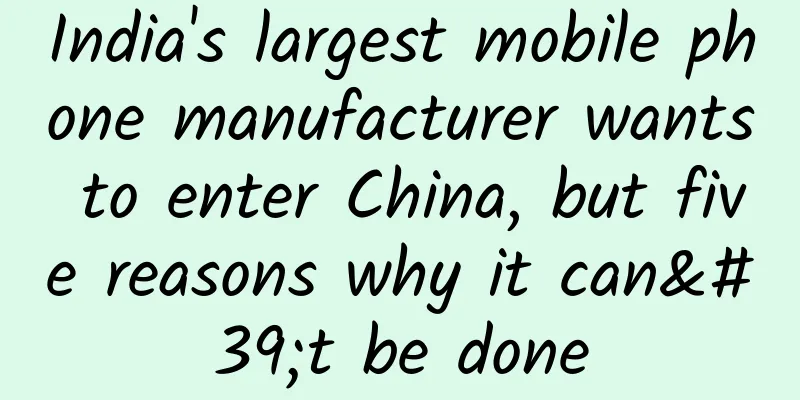India's largest mobile phone manufacturer wants to enter China, but five reasons why it can't be done

|
Recently, a piece of news came out from the Indian mobile phone market that shocked Chinese consumers: Micromax, India's largest local mobile phone manufacturer, announced that it would sell smartphones in China in 2017. Foreign media recently cited reasons such as "the lack of differentiated features of mobile phones and restrictions on Google services in China" and pointed out that Micromax's prospects in the Chinese mobile phone market are very slim. According to foreign technology media BGR, Vikas Jain, co-founder of Micromax, recently said that he plans to enter the Chinese smartphone market next year. He also said that Micromax plans to go public within a few years, so it will do everything possible to expand the market and mobile phone sales. Micromax ranks second in the Indian smartphone market, second only to Samsung Electronics. According to IDC statistics, Micromax's market share in India in the first quarter of this year was 12.6%, significantly lower than 17.9% in the fourth quarter of last year. In addition to the Indian market, the company has already sold mobile phones in Russia and Nepal. Micromax is not the only company experiencing a decline in the Indian market. IDC pointed out that the Indian smartphone market shrank by 8.2% in the first quarter compared with the fourth quarter of last year, marking two consecutive quarters of decline. Indian local mobile phone companies are facing increasingly fierce competition, including new entrants from India and a large number of Chinese smartphone manufacturers, such as Oppo, Xiaomi, Vivo, Coolpad, etc. Chinese companies have gained some market share in India by using extremely cost-effective pricing and marketing strategies. Foreign media pointed out that there are five reasons why Indian mobile phone companies will face difficult challenges in the Chinese market. 1. China’s mobile phone market is already slowing down China's smartphone market has begun to become saturated, and the growth rate of smartphones has begun to decline. For example, according to IDC data, in 2013, the growth rate of smartphones in China was as high as 62.5%, but by last year, it had dropped to 2.5%, basically stagnant. 2. Chinese brands have already dominated the home market The global influence of Chinese mobile phone companies is rising rapidly. Among the top five manufacturers in the world, three are from China, namely Huawei, Oppo and Vivo. And all three brands are exploring the market in India. The fierce competition in China's smartphone market has even put Apple in a difficult position. In the first quarter of this year, Apple's sales in China dropped sharply from 16.2 million units in the same period last year to 13.1 million units. Faced with the fierce competition in the Chinese market, Apple has decided to invest more resources in India. In addition to the above three companies, Samsung Electronics and Xiaomi are also very strong in China. In the Indian market, where smartphone development is still in its infancy, Micromax can rely on its first-mover advantage to gain a foothold. However, in the Chinese market, there is obviously no blank area for Micromax to fill. 3. Micromax has no differentiation advantage If one looks closely at Micromax's smartphone lineup, one will find that they are no different from Chinese Android phones. As we all know, all Android phones in the world are equipped with the same operating system, and the user experience is becoming more and more similar. Earlier, Micromax launched a mobile shopping platform "Around YU" in an attempt to use it as a differentiating feature, but this feature is still in the early stages of development and still has many imperfections. As for the digital content behind smartphones, Chinese manufacturers such as LeTV and Xiaomi already have an advantage, and Micromax does not have the strength to compete with them. In terms of pure mobile phone hardware, Micromax has no advantage over Huawei, Coolpad, Xiaomi and other companies. However, in terms of product pricing and cost performance, Chinese companies are not inferior to Micromax at all. 4. No ecosystem The Chinese smartphone market is highly competitive. Many manufacturers have been operating in brand building and promotion, product design, manufacturing and supply chain management for a long time and have built a huge ecosystem. Foreign media pointed out that it would be difficult for Micromax to gain an advantage in the Chinese market solely relying on factors such as pricing. 5. Google services are limited Many smartphone manufacturers in India are equipped with Google's mobile Internet service framework, without having to invest their own efforts in product development. However, in China, Google has long since withdrawn from the market. On the Android platform, Chinese smartphone manufacturers play a leading role, establishing their own branded software stores and even developing many tool-based products including weather, calendar, music player, video player, and security anti-virus. After entering the Chinese market, Micromax will not be able to migrate the Google application ecosystem and will need to re-develop products and services for Chinese consumers, which will bring huge challenges to Micromax. If Micromax adopts the white-label model, it will be even more difficult to find opportunities to be remembered in the Chinese market. As a winner of Toutiao's Qingyun Plan and Baijiahao's Bai+ Plan, the 2019 Baidu Digital Author of the Year, the Baijiahao's Most Popular Author in the Technology Field, the 2019 Sogou Technology and Culture Author, and the 2021 Baijiahao Quarterly Influential Creator, he has won many awards, including the 2013 Sohu Best Industry Media Person, the 2015 China New Media Entrepreneurship Competition Beijing Third Place, the 2015 Guangmang Experience Award, the 2015 China New Media Entrepreneurship Competition Finals Third Place, and the 2018 Baidu Dynamic Annual Powerful Celebrity. |
<<: Hong Kong's valuation has always been low, why did Wanda only think of delisting today?
>>: How long will Apple's decline continue? Can iPhone 7 turn the tide?
Recommend
Teach you how to analyze the Android system startup process step by step
[[424940]] In the previous article, we talked abo...
Can cancer spread among family members? Eating vegetarian food every day will prevent high blood lipids? Here is the list of scientific rumors for May
1. Should the thyroid gland be removed if a thyro...
What is the technology behind the popular AI painting? (Part 2)
In the previous issue, we introduced the GAN mode...
An event planning and execution form template
one Over the years of work, I have participated i...
There is something fishy in the XCode compiler – 51CTO analyzes the “Apple APP poisoning incident”
A virus hidden in the XCode compiler celebrates t...
Yiche.com: BYD occupies seven of the top ten domestic car sales in August 2024
Yiche.com compiled a sales ranking of domesticall...
Don't use these "anti-radiation" products indiscriminately! Remember these 6 tips to stay away from radiation in your life!
Recently, topics such as nuclear radiation and ra...
Brand promotion, the underlying logic of 3 brand brainwashing!
First of all, congratulations to the students who...
Facing disaster
Smiling Georgia medical volunteers made a "h...
3 cases to help you improve your event operations
In this article, the author starts with three cas...
How to efficiently acquire seed users? Baidu's senior operations manager shares these 4 methods with you!
This is a relatively new product and there are no...
Data statistics interface-graphic and text analysis data interface
Xin public platform launched the invitation-based...
WeChat public account interception technology, simple operation to earn 670 yuan a day!
It's the Spring Festival holiday, but people ...
A complete method for running a good event, with 12 cases
Even if the product's features and experience...
The PC industry is unable to grow rapidly. Are Microsoft and Intel stuck in a quagmire?
January 14, 2013 To the surprise of some, the PC ...









